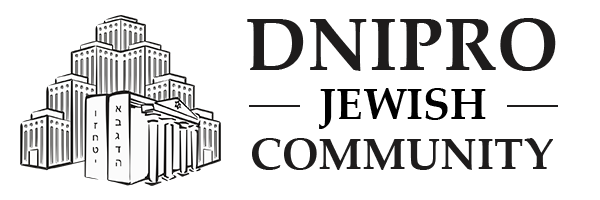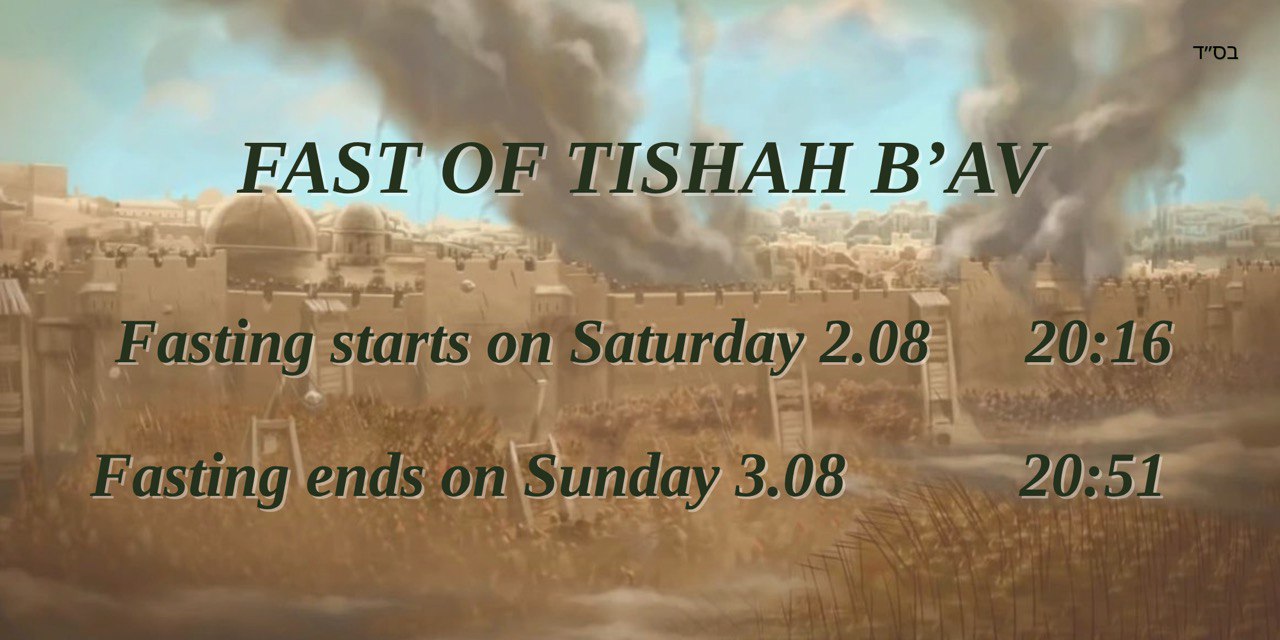This year, the Ninth of Av begins on Saturday evening, August 2nd. We are publishing several important details and nuances related to the observance of the Tisha B’Av fast.
Let us recall that Tisha B’Av — the Day of Fasting and Mourning — was established in memory of the destruction of both the First and Second Temples in Jerusalem, which occurred on this date. This is a full-day fast — it begins at sunset and ends after nightfall. The fast is very strict, comparable to Yom Kippur.
TISHA B’AV FAST 5785
Fast begins in Dnipro: Saturday, August 2, at 8:16 PM
Fast ends: Sunday, August 3, at 8:51 PM
Prayer schedule at the “Golden Rose” synagogue:
Saturday: Mincha — 1:25 PM
Saturday: Maariv — 9:30 PM
Reading of Megillat Eicha — 9:45 PM
Sunday: Shacharit — 7:00 AM and 10:00 AM
Sunday: Mincha — 7:14 PM
Sunday: Maariv — 8:45 PM
Forbidden: eating, drinking, bathing, anointing with oils or perfumes, wearing leather shoes, and marital relations during the 24 hours.
- Fast begins in Dnipro — Saturday, August 2, at 8:16 PM
- Fast ends — Sunday, August 3, at 8:56 PM
Anyone who has serious difficulty fasting — pregnant women, postpartum women, nursing mothers, or those with medical conditions — must consult a rabbi for individual instructions.
Friday, August 1 — Shabbat Chazon — Eve of Tisha B’Av
On Shabbat, the customs of mourning are not observed. It is permitted to eat meat and drink wine as part of the regular Shabbat meals. Shabbat songs are sung as usual.
During Shabbat prayers, all standard portions are recited, including “Lecha Dodi.”
SATURDAY, AUGUST 2 – SHABBAT CHAZON – EREV (EVE OF) TISHA B’AV
Reading of Chitas – until 12:45 PM
Mincha – at 1:25 PM
It is customary to pray Mincha earlier in the afternoon in order to have time afterward for the Seudah Mafseket (the final meal before the fast).
During Mincha, “Tzidkatcha” (Your righteousness) is not recited, and following Mincha, the chapter from Pirkei Avot (Ethics of the Fathers) is also not read.
Seudah Mafseket – Final Meal Before the Fast
This is the last meal before the fast begins. One eats a regular Shabbat meal without any mourning restrictions.
After the meal, leftover food may be returned to the refrigerator, and the table may be cleared if mess is bothersome.
The meal must be finished before the fast begins – at 8:16 PM.
From that time, handwashing is only permitted up to the first knuckle.
Children from age 9 and older are trained to fast for a few hours, depending on their individual strength.
However, they must not fast the full 25 hours under any circumstances.
As long as Shabbat has not ended, no preparations for the fast may be made, such as removing non-leather shoes.
AFTER SHABBAT ENDS (AT 8:59 PM)
Say: “Baruch Hamavdil Bein Kodesh Lechol”
Then it is permitted to change into cloth or rubber shoes — leather shoes remain forbidden!
Havdalah is performed on Sunday after the fast ends!
However, on Saturday night one says the blessing over fire (“Borei Meorei HaEsh”) upon seeing a newly lit flame.
The “Vayiten Lecha” blessing (“And may He grant you…”) is not said.
MAARIV AND READING OF “EICHA” IN THE SYNAGOGUE
Only minimal lighting is left on in the synagogue — sufficient for reading the prayer and the Scroll of Eichah.
After the Maariv prayer, sitting on low stools (no higher than 30 cm), the congregation reads the Book of Eichah (Lamentations).
Then Kinot (dirges) are read, followed by the conclusion of Maariv with:
“Ata Kadosh” (“You are Holy…”) and “Aleinu” (“It is our duty…”).
The blessings “And may God grant you…” are not recited.
It is not customary to greet one another. If someone was unaware and greeted you, it is permitted to quietly inform them that today is Tisha B’Av.
Women also participate in reading or listening to Eichah.
Elderly or weak individuals may sit on regular chairs, as this is considered a necessity, not a comfort.
After Eichah, Kinot are read and Maariv concludes with “Ata Kadosh”, the Full Kaddish (without “Titkabel”), and “Aleinu”.
Women do not wear jewelry on Tisha B’Av, but it is permitted to wear a ring or item they usually wear daily.
Dishes used during Shabbat may only be washed on Sunday after midday (chatzot – 12:45 PM).
However, dishes with unpleasant odor may be washed immediately after Shabbat, using only cold water.
In the bedtime Shema prayer, the Tachanun (supplication prayer) is not recited.
SUNDAY, TISHA B’AV
Netilat Yadayim (hand washing) after sleep is done only on the fingers, up to the first knuckle.
The eyes may be wiped with the water remaining on the fingers after washing.
If there is dirt on the face or eyes, it may be wiped off carefully with a small amount of water.
In the morning blessings, “She’asa Li Kol Tzorki” (“…who has given me all that I need”) is not recited.
Washing hands after using the bathroom and before prayer is done only up to the first knuckle.
A person who works until midday on Tisha B’Av will not receive blessing from that work. A God-fearing person will not work after midday either, so as not to be distracted from mourning.
On Tisha B’Av it is forbidden to engage in activities that distract from the mourning.
SHACHARIT PRAYER
They do not wear a tallit and tefillin. They do not hold the tzitzit during the recitation of “Boruch She’omar” and “Shema”.
Order of prayer:
- From the beginning until the end of the “Shmoneh Esrei,” the prayer is as usual;
- Tachanun is not recited;
- The prayer leader (chazzan) says “Aneinu” (“Answer us”) during the repetition of the “Shmoneh Esrei”;
- Then the Torah is read, the chapter “Va’etchanan” (“When you beget sons”). The third passage is the maftir (final reading). The haftarah is read from the book of Jeremiah;
- The person who is called up to the Torah may sit on a regular chair during the rolling of the Torah and the reading of the haftarah;
- After the haftarah, the Torah is returned to the ark and the Kinot (lamentations) are read;
- Kinot are read sitting, but the passage “Eli Tzion” is recited standing;
- Kinot should be read with concentration on the grief of the Temple’s destruction;
- The reading of Kinot is not interrupted by idle conversation;
- Then “Ashrei” (“Happy are those…”) is read, the prayer “Uva Letzion” (“And the redeemer will come”), skipping the phrase “va’ani zot briti” (“and I, this is my covenant”);
- The full Kaddish is recited without “Titkabel” and without “Aleinu”;
- “Shir Shel Yom” and “Ein Ke’Elokeinu” (“There is none like our God”) are not recited;
- According to our custom, after reading Kinot during the day, “Eicha” (the Book of Lamentations) is recited;
- Even a person praying alone recites Kinot and Eicha;
- Kinot and Eicha must be finished before midday — by 12:45 PM.
On Shabbat after midday (12:45), only those texts allowed for study on Tisha B’Av are studied — passages describing the events of the Temple’s destruction and the laws of Tisha B’Av.
The Torah reading is chapter “Va’etchanan” and the haftarah from Jeremiah.
All Kinot are read, then Ashrei, Uva Letzion, and Aleinu.
“Shir Shel Yom” and “Ein Ke’Elokeinu” are not read.
Until 12:45 PM no work is performed, no food is prepared (except for children and the sick), and one does not sit on high chairs.
The meal for breaking the fast is prepared only after midday.
After midday, it is permitted to wash fruits and vegetables and to wash dirty dishes, even though hands may be fully submerged in water, as this is not done for pleasure.
After midday, beds are made and the house is tidied.
On Tisha B’Av, floors are not washed, but dirty spots may be cleaned.
Havdalah for Those Allowed to Eat on Tisha B’Av
A man or woman who is permitted for any reason to eat on Tisha B’Av must make Havdalah before eating.
The wine is given to a small child who is already accustomed to blessings but does not yet understand the meaning of mourning — usually a child around 6–9 years old.
If no such child is present, the person making Havdalah drinks the wine themselves.
A woman is permitted to make Havdalah over the “drink of the country” — tea or coffee — and then drink it herself.
All those permitted to eat on Tisha B’Av eat only what is truly necessary for the body.
If a person needs to take medication, they should swallow the pill without water. If this is difficult, they may drink water, but only bitter water, such as very strong tea or water with added spices.
MINCHA PRAYER
Tzedakah is given before Mincha.
Before Mincha, the Parochet (“curtain of the Ark”) is returned to its place.
We put on the tallit and tefillin with a blessing. We read the “Shema” – all three parts, “Shir Shel Yom” (Psalms of the day), and “Ein Ke’Elokeinu” (“There is none like our God…”), “Tehillim,” and “Chitas.”
The Mincha prayer is said while wearing the tallit and tefillin.
Torah reading: the third person called up reads the Haftarah.
In the Amidah prayer, the insertions “Nahem” (“Console us, Lord”) and “Aneinu” (“Answer us, Lord”) are included. A person who is not fasting does not say “Aneinu” (“Answer us”), but only “Nahem” (“Console us”).
After Mincha, the Rabbeinu Tam tefillin are put on.
MAARIV PRAYER. END OF TISHA B’AV
After the evening prayer at the conclusion of the fast, one should wash their hands three times alternately (as after sleep) without a blessing, wash the face, and rinse the mouth.
Then leather shoes are put on and the ceremony of Kiddush Levanah (Sanctification of the Moon) is performed.
If a woman finds it difficult to wait for her husband to return from the synagogue, she may recite Havdalah herself over tea or coffee.
Havdalah is performed without a candle and without spices — only over a cup of wine.
It is forbidden to eat meat and drink wine until 12:45 PM on August 4th. Washing clothes, bathing, cutting hair, reciting the Shehecheyanu blessing, and listening to music are also prohibited until midday.
In the bedtime Shema, Tachanun is recited.
Have an easy fast! And may God grant that we merit the coming of the Mashiach very soon, and that this day of mourning turns into a day of celebration, joy, and happiness!




